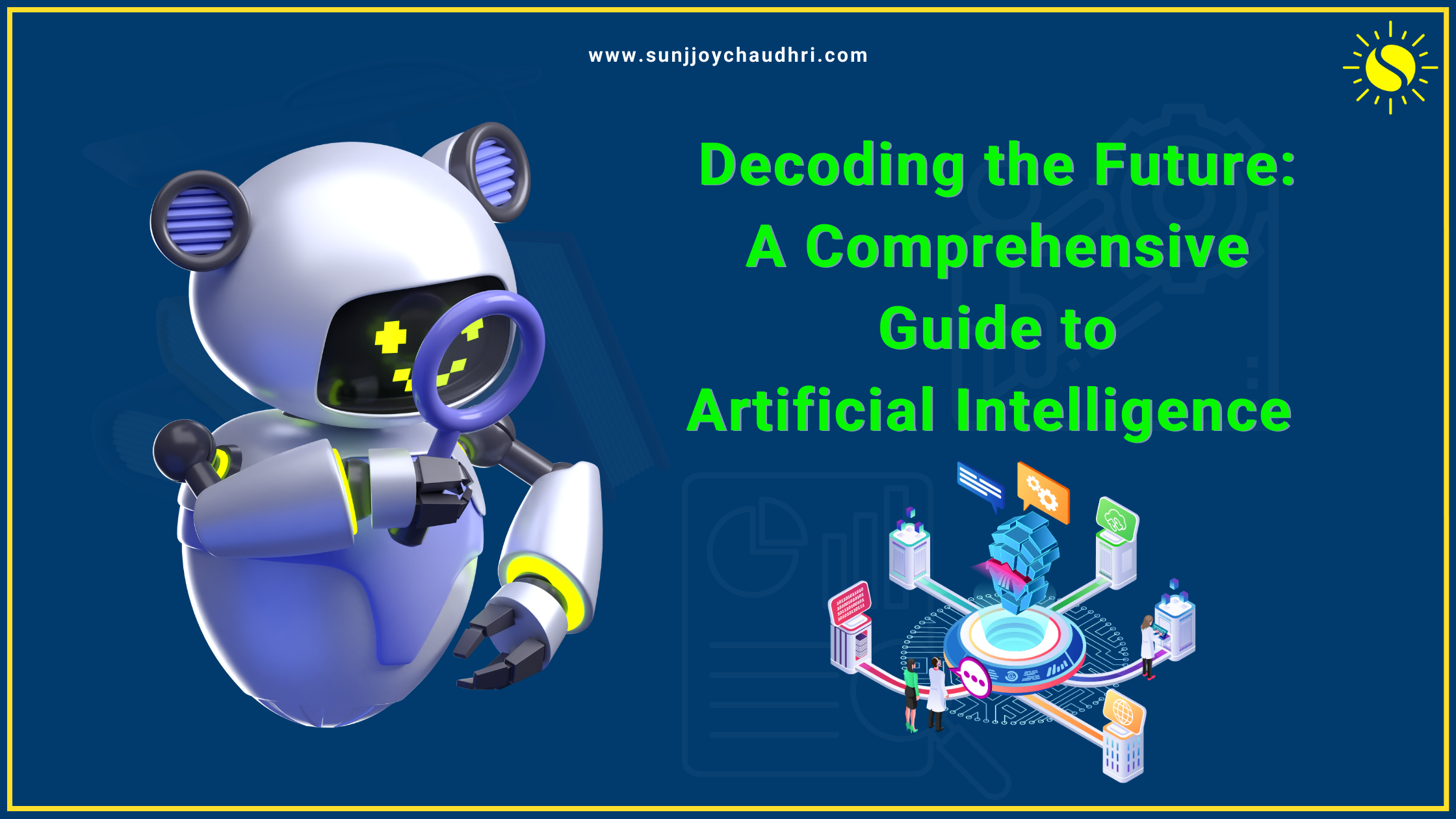Introduction to Artificial Intelligence
Define artificial intelligence (AI) and its meaning:
Artificial intelligence (AI) refers to the development of computer systems capable of performing tasks that typically require human intelligence. It encompasses activities such as reasoning, problem-solving, learning from past experiences, and understanding natural language. AI aims to create machines that can mimic human cognitive functions, allowing them to make decisions, solve complex problems, and adapt to new situations.
Differentiate AI from machine learning (ML):
AI is a broader concept that encompasses machine learning (ML). While AI includes the entire spectrum of creating intelligent machines, ML is a subset of AI. ML focuses on the development of algorithms that enable computers to learn from and make predictions or decisions based on data. In essence, ML is a technique within AI that empowers machines to improve their performance on a specific task through experience and data.
Discuss the importance of AI in the business world:
AI plays a pivotal role in the business world by enhancing efficiency, decision-making, and innovation. It automates repetitive tasks, streamlines operations, and offers data-driven insights. In marketing, AI aids in personalized customer experiences, while in finance, it detects fraud and predicts market trends. AI-driven analytics helps companies make informed decisions, optimize supply chains, and improve customer service, ultimately leading to competitive advantages and growth in the modern marketplace.
Types of Artificial Intelligence
Explain the various types of Artificial Intelligence AI, including narrow AI and artificial general intelligence (AGI):
There are several types of artificial intelligence (AI), each with distinct capabilities:
Narrow AI (Weak AI): Also known as Weak AI, Narrow AI is designed for a specific task or domain. It excels in performing predefined tasks but lacks general intelligence. Examples include virtual personal assistants like Siri and Alexa, chatbots, and recommendation systems.
Artificial General Intelligence (AGI): AGI, often referred to as Strong AI, possesses human-level intelligence. It can understand, learn, and apply knowledge across a wide range of tasks, similar to human cognition. AGI remains a theoretical concept and is not yet realized in practice.
Superintelligent AI: This is a speculative concept where AI surpasses human intelligence. It could potentially create AI entities with even greater intelligence. Superintelligent AI is a subject of debate and ethical concerns and is not currently within our technological reach.
These categories represent the spectrum of AI capabilities, from specialized, task-oriented AI to the theoretical goal of achieving human-like general intelligence (AGI).
Applications of Artificial Intelligence in Business
- Provide examples of how AI is used in businesses:
- Customer Service Chatbots: Many businesses employ AI-powered chatbots to handle customer inquiries, provide support, and streamline interactions on websites and social media.
- Predictive Analytics for Sales and Marketing: AI-driven predictive analytics tools analyze vast datasets to forecast trends, customer behavior, and sales opportunities, enabling companies to make data-informed decisions.
- AI-Driven Supply Chain Optimization: AI helps optimize supply chain operations by predicting demand, managing inventory, and optimizing logistics, resulting in cost savings and improved efficiency.
- Fraud Detection and Cybersecurity: AI is crucial in identifying and mitigating cybersecurity threats. It can analyze network traffic, detect anomalies, and respond to potential breaches in real time.
- Discuss how AI and data science work hand in hand:
AI and data science are interdependent fields that complement each other:
Data as the Fuel for AI: AI algorithms require large amounts of data to learn and make predictions. Data science professionals collect, clean, and preprocess data to ensure it’s suitable for AI applications.
Feature Engineering: Data scientists play a vital role in selecting and engineering relevant features from datasets, enhancing AI models’ performance.
Training and Validation: Data scientists split data into training and validation sets to train AI models and assess their accuracy, ensuring they generalize well to new data.
Continuous Improvement: AI models need continuous monitoring and refinement based on new data. Data scientists analyze model performance and retrain them to adapt to changing circumstances.
AI and data science collaboration maximize the potential of AI applications by ensuring the quality, relevance, and continuous improvement of the underlying data and algorithms.
Also Read:Unleashing Success: Harnessing the Power of Competitor Analysis Tools
The Future of Artificial Intelligence in Business
- Explore the evolving role of AI in the business landscape:
AI’s role in the business landscape continues to evolve:
Automation: AI is increasingly used to automate repetitive tasks, reducing costs and increasing efficiency.
Data-Driven Decision-Making Businesses rely on AI to analyze vast datasets, providing valuable insights for strategic decisions.
Customer Engagement: AI-powered chatbots and recommendation systems enhance customer experiences.
Predictive Analytics: AI predicts market trends, customer behavior, and demand for better planning.
Supply Chain Optimization: AI optimizes logistics, reduces waste, and enhances supply chain resilience.
As AI technologies mature, they become integral to business strategies, offering a competitive edge and transforming industries.
- Discuss emerging AI trends:
Emerging AI trends include:
AI for Sustainability: AI is used to address environmental challenges, such as climate modeling, energy optimization, and sustainable agriculture. AI Ethics and Bias Mitigation: There’s a growing focus on ethical AI development and combating biases in algorithms. AI in Healthcare: AI assists in disease diagnosis, drug discovery, and personalized medicine.
AI-powered Cybersecurity:
AI helps detect and respond to cyber threats in real time. AI in Edge Computing: AI is moving closer to data sources, enabling faster decision-making in IoT devices.
Quantum AI:
The intersection of quantum computing and AI promises to solve complex problems. These trends signify AI’s expanding influence across diverse domains, shaping the future of technology and business.
AI Software and Applications
Describe the various AI software solutions available for businesses:
AI software solutions for businesses encompass a wide range of applications, including:
Automation: AI automates repetitive tasks, reducing manual effort and improving efficiency
Data Analytics: AI-driven analytics tools extract valuable insights from large datasets, aiding in data-driven decision-making.
Natural Language Processing (NLP): NLP enables machines to understand and generate human language, useful for chatbots, language translation, and sentiment analysis.
Machine Learning Platforms: These platforms facilitate the development, training, and deployment of machine learning models for various tasks.
Computer Vision: AI-driven computer vision systems can analyze and interpret visual information, used in image recognition, object detection, and quality control.
Recommendation Engines: AI-powered recommendation systems provide personalized product or content recommendations.
Predictive Analytics: AI predicts future trends, behaviors, and events, assisting businesses in planning and optimization.
These AI solutions help businesses enhance productivity, customer experiences, and decision-making.
- Provide insights into AI app development:
AI app development involves several key steps:
Define Objectives: Clearly define the app’s purpose, functionality, and target audience.
Data Collection: Gather and preprocess relevant data for training AI models.
Algorithm Selection: Choose suitable AI algorithms or models based on the app’s requirements.
Training: Train the AI model using labeled data and iterative refinement.
Integration: Integrate the AI model into the app’s architecture, ensuring seamless operation.
Testing: Thoroughly test the app, including AI components, for accuracy and performance.
Deployment: Deploy the app, monitor its performance, and implement updates as needed.
Ethical Considerations: Address ethical and privacy concerns associated with AI, ensuring responsible usage.
Successful AI app development requires a multidisciplinary approach, involving data scientists, developers, and domain experts to create valuable and ethical AI-driven applications.
Challenges and Concerns
AI in business presents various challenges and ethical concerns:
- Bias and Fairness: AI systems can perpetuate biases present in training data, leading to discriminatory outcomes in hiring, lending, and other critical areas.
- Transparency: AI decision-making can be opaque, making it difficult to understand why specific decisions are made. Lack of transparency can erode trust.
- Privacy: The collection and analysis of vast amounts of personal data raise privacy concerns. Businesses must ensure data is used responsibly.
- Job Displacement: The automation of tasks using AI can lead to job displacement, raising questions about workforce transitions and job security.
- Accountability: Determining responsibility for AI errors or malfunctions can be challenging, affecting liability and legal considerations.
- Ethical Decision-Making: AI systems may face ethical dilemmas that require decision-making frameworks, like autonomous vehicles making life-or-death choices.
- Security: AI systems are vulnerable to hacking and adversarial attacks, posing security risks.
Addressing these challenges and ethical concerns is crucial for businesses to ensure AI is developed, deployed, and used responsibly and ethically.
Conclusion
AI has transformative uses in businesses:
- Automation: AI automates routine tasks, saving time and reducing errors.
- Data Analytics: AI analyzes vast datasets for insights, aiding decision-making.
- Customer Service: Chatbots provide 24/7 support, enhancing customer experiences.
- Personalization: AI tailors product recommendations and content to individual preferences.
- Sales and Marketing: Predictive analytics optimize sales strategies.
- Supply Chain: AI improves logistics, inventory management, and demand forecasting.
- Quality Control: Computer vision ensures product quality.
- Cybersecurity: AI detects and mitigates security threats.
- Human Resources: AI aids in recruitment and HR management.
- Healthcare: AI assists in diagnostics and drug discovery.
These applications enhance efficiency, competitiveness, and customer satisfaction, making AI a vital asset for modern businesses.


